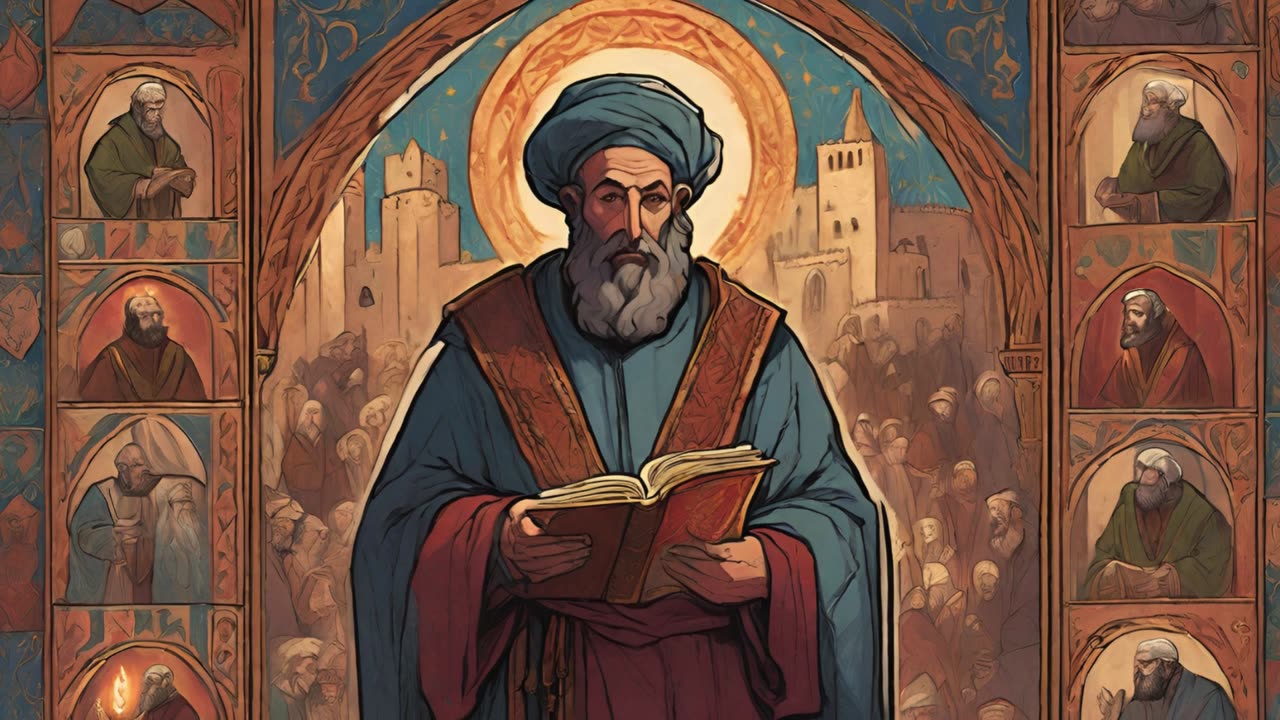Premium Only Content

Maimonides: A Beacon of Clarity in the Philosophical Landscape
In the rich tapestry of medieval philosophy, one figure stands out as a luminary of clarity and wisdom—Maimonides. Also known as Moses ben Maimon, this 12th-century philosopher, physician, and scholar left an indelible mark on both Jewish thought and the broader philosophical discourse of his time. Let's embark on a journey to unravel the accessible brilliance of Maimonides' teachings.
Born in Cordoba, Spain, in 1138, Maimonides navigated a world marked by cultural diversity and intellectual ferment. His philosophical contributions, deeply rooted in both Jewish and Islamic traditions, continue to resonate with thinkers across religious and cultural boundaries.
At the heart of Maimonides' philosophy is the reconciliation of reason and faith. In his monumental work, "The Guide for the Perplexed," Maimonides sought to harmonize religious beliefs with rational inquiry. He recognized the tension between literal interpretations of religious texts and the insights gleaned from philosophical reasoning, endeavoring to bridge the gap for those perplexed by the apparent conflicts.
One key concept in Maimonides' teachings is the idea of God as the ultimate, transcendent reality. He emphasized the importance of negative theology, asserting that we can only describe what God is not, given the limitations of human language and understanding. This approach aimed to safeguard the ineffable nature of the divine and discourage anthropomorphic interpretations.
Maimonides also delved into the nature of knowledge and intellect. He proposed a hierarchy of intellects, asserting that individuals could ascend from the material world to the intellectual realm through contemplation and philosophical inquiry. This framework aimed to illuminate the path to understanding the divine and attaining a higher level of spiritual awareness.
Ethics played a central role in Maimonides' philosophy. He outlined the importance of cultivating moral virtues and reaching a state of balance and moderation, avoiding extremes. Maimonides believed that ethical conduct was integral to the pursuit of divine knowledge and the fulfillment of one's purpose in life.
Maimonides' legacy extends beyond the realm of philosophy into medicine, where he made significant contributions as a physician. His emphasis on the connection between physical and mental well-being reflected his holistic approach to human flourishing.
In the mosaic of medieval philosophy, Maimonides shines as a beacon of clarity, offering insights that transcend religious and cultural boundaries. His teachings invite us to engage in both rational inquiry and spiritual reflection, fostering a harmonious relationship between reason and faith. As we navigate the complexities of our own philosophical inquiries, Maimonides' timeless wisdom continues to guide us toward a deeper understanding of the divine and the human experience.
-
 LIVE
LIVE
Right Side Broadcasting Network
4 hours agoLIVE: President Trump Participates in First Cabinet Meeting - 2/26/25
12,142 watching -
 LIVE
LIVE
vivafrei
3 hours agoCanadian Liberal Leadership Race TO THE BOTTOM! Florida Prosecutor Claims SELF DEFENSE? & MORE!
756 watching -
 LIVE
LIVE
Simply Bitcoin
1 hour agoNEW REPORT PROVES This Bitcoin Bull Run is DIFFERENT!! | EP 1191
153 watching -
 LIVE
LIVE
The Charlie Kirk Show
38 minutes agoJudges vs. The People + Is DOGE Enough? + Fort Knox | Rep. Roy, Glenn, Plume, Posobiec | 2.26.2025
4,144 watching -
 LIVE
LIVE
The White House
2 hours agoPresident Trump Hosts First Cabinet Meeting, Feb. 26, 2025”
6,570 watching -
 58:16
58:16
The Dan Bongino Show
3 hours agoShake-Up In The White House Press Room (Ep. 2431) - 02/26/2025
329K689 -
 1:00:00
1:00:00
The Rubin Report
2 hours agoDem Looks Visibly Angry as Stephen A. Smith Points Out Failures to His Face
9.2K13 -
 LIVE
LIVE
Benny Johnson
1 hour ago🚨 Trump's First White House Cabinet Meeting LIVE Right Now | Massive News Breaking
10,266 watching -
 2:05:04
2:05:04
Steven Crowder
3 hours agoTrump Keeps Delivering | This Week’s 3 Big Wins Explained
250K148 -
 UPCOMING
UPCOMING
Flyover Conservatives
1 hour agoProphecies | Breakthrough, Zelensky and 2040 - The Prophetic Report with Stacy Whited
394